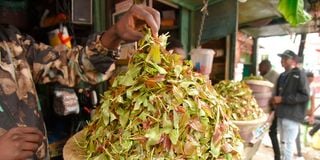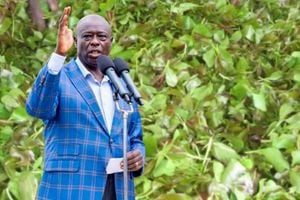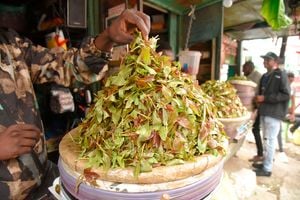
Muguka traders display their wares in Nakuru City
Stephen Mwaniki wakes up at 6am to harvest muguka and by 8am, he is ready to take his produce to the market.
At Muraru and Meka, the largest collection centres in Mbeere constituency, Embu County where the crop is mainly grown, Mr Mwaniki joins thousands of other farmers. Each day, they sell 36,000 kilos worth over Sh10.8 million with a kilo going for between Sh300 and Sh700. During dry seasons, the same quantity is sold for up to Sh1,000.
It is a lucrative business on which Embu County’s economy depends, earning the devolved unit an estimated Sh22 billion annually from farming, transport and sale. This dwarfs the county’s coffee and tea annual earnings of Sh2.5 billion and Sh3.8 billion respectively.
If plans by leaders at the coast and northern Kenya succeed, this business will shut down. At the coast, Mombasa governor Abdulswamad Nassir said residents spend at least Sh7 billion on the stimulant annually.
Mr Nassir, Gideon Mung’aro (Kilifi) and Andrew Mwadime (Taita Taveta) banned transport, trade and consumption of the stimulant saying its abuse has destroyed the lives of residents including children.
Their Kwale counterpart Fatma Achani slapped the produce with a Sh300,000 levy per lorry, making it difficult for traders to make money from the produce.
They have been joined by MPs from the region with Kilifi North MP Owen Baya planning to table a motion in parliament to have muguka and miraa struck from the list of Agriculture ministry’s scheduled crops. Former deputy speaker Farah Maalim is also rallying Garissa, Wajiir and Mandera governors to ban the stimulant.
Sh22 billion
But for farmers and leaders in Embu County, it is the battle for their Sh22 billion economy with Governor Cecil Mbarire, Senator Anderson Murago, members of parliament and the county assembly vowing to defend their economy.
Muguka is largely grown in the expansive arid Mbeere area.
The scientific name of the plant that produces miraa and muguka is Cathaedulis with the leaf and stem containing cathinone and cathine, two elements that cause intoxication and are used as a stimulant for recreation and medicine or herb.
While for miraa users peel the twigs and chew to extract the juice, for muguka, the leaves are chewed.
According to Mr Amos Njeru, a trader, muguka started being traded in markets, especially at the coast in 2009. “Since miraa is very expensive, we used to offer customers muguka as a substitute. We would give them free samples and with time they got used,” he said.
Over the past 15 years as the market grew, farmers abandoned other crops including maize and beans and switched to muguka farming due to its monetary value.
At 28, Mr Mwaniki represents thousands of other young farmers who are engaged in growing of muguka for a living.
“Initially I was engaged in maize farming and I used to earn Sh12,000 from my three-acre farm. When I ditched maize and started growing muguka, I now earn over Sh500,000 from the same farm every year,” Mr Mwaniki said, adding that he is able to provide upkeep for his twin children and wife through this farming.
“I am also a college student and I pay school fees for myself, I have also bought three motorcycles which I also use to make money. Muguka is our gold and no one should interfere with it,” he said, adding that muguka means everything to the thousands of Embu residents and they are not ready to let go.
The residents said the crop takes only one year to mature and is suited to the arid areas in Mbeere since it endures harsh weather. "Even when the rain fails it doesn't dry up and it is a crop for Mbeere where water is a scarce commodity," said Mr Peter Muriithi, the chairman of Mbeere Muguka Farmers Association.
Another resident Mr Daniel Njoka narrated how the residents switched from growing food crops to planting and harvesting the herbal stimulant, popularly known as Muguka.
He explained that Muguka is a variety of Miraa which gives them good money compared to the food crops.
Residents say they now make almost four times as much from growing khat instead of growing food crops such as maize, green grams and beans among others.
"I used to grow bananas and sukuma wiki (kales) but I was frustrated due to lack of a good market for them. More often the vegetables went to waste because there were no buyers. When I tried muguka farming, my life was transformed and now I earn more money than before,” said Mr Njoka.
The residents recounted how they lived in horrible conditions before they ventured into the muguka business.
"We used to live in dilapidated grass-thatched and mud-walled huts. But now we live in stone buildings and we don't regret growing muguka, which is our green gold," another resident Mr Eston Makothe, 59 said, adding that he doesn't know any other business.
"I learnt about Muguka farming from my mother. I use the money I receive from Muguka sales to educate my children and feed them. I have also constructed a modern stone house and I don't regret growing Muguka, If Muguka farming is outlawed then my children will drop out of school and my life will be ruined," said Mr Makothe.
The crop has transformed the lives of the people and the recent ban imposed on its sale, transportation and distribution in Mombasa and Kilifi counties has dealt the residents a devastating blow.
65,000 farmers
Statistics obtained from Embu County indicate that at least more than 65,000 farmers and residents are engaged in the muguka farming business and the number is increasing with coast counties serving the biggest markets.
Embu Senator Alexander Mundigi said muguka value chain earns residents more money than tea and coffee combined and that it was important to this region and if banned the economy of Embu will collapse.
Mr Mundigi urged the farmers and players in the value chain to exercise calm as "we seek avenues to resolve this stalemate."
He dismissed claims that muguka causes impotency, saying the population of Embu was increasing each year. “This is propaganda because we know that muguka is medicinal and it should not be demonised," he said.
Mr Mundigi who is also the vice chairman of Senate Agriculture Committee said he will lobby legislators to support Meru senator and deputy speaker Kathuri Murungi’s bill that seeks to remove cathinone and cathione from the drugs classification to pave the way for value-addition and international marketing.
“If this motion sails through residents will add value to the produce and benefit a lot. They can make wine, juice and chewing gum using muguka," he said.
The senator said after President William Ruto held talks with Embu leaders, he assured them that all will be well despite the opposition from coast leaders.
"The President agreed with us that muguka farming is legally established and it should not be interfered with,” he said and revealed that the Head of State assured the leaders that the value addition budget would be raised from the current Sh135 million to Sh500 million to boost its farming.
According to Mbeti South Ward MCA Mr Muriithi Kiura, the Embu county assembly last year passed a law that controls trade in muguka.
“The law provides that children are not supposed to trade in muguka and even chew it. The law controls muguka trade to ensure that farmers benefit while children are protected,” he said.
Mr Kiura said they were also building grading shades for the produce, adding that the county government would also control the quantities going to the market.
“We discovered that huge quantities are going to our markets and after flooding there the produce is sold cheaply. We want to control so that we supply what is required in particular markets across the country,” Mr Kiura said.












